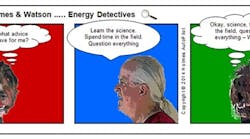Watson: What advice can you give me at the beginning of my career, Holmes?
Holmes: One of your most important roles as an energy engineer and manager and Certified Energy Dog, will be to listen to the views of all involved and separate fact – physics, good science and engineering, from misinformation, myth, hype and sales pressure. You have the engineering training while most of the people you will be dealing with will not. You need to gain practical and “real-world” field experience; that is very important. You also need to develop enough confidence to be unafraid to ask questions of the various people you will encounter. Learn everything you can – both the right and the wrong ways from others; what to do and what not to do.
Understanding that you must question and determine the validity of what you see and hear is one of the most important things you need to learn if you are to work in the energy efficiency field. It is often the single most important service I provide for my clients and it is never ending.
Watson: Why not just recommend new equipment like most others do?
Holmes: There is a lot of pressure from manufacturers, lobbyists, utility companies and government programs to replace old equipment with new more efficient equipment under the guise of saving energy. Selling equipment is how many in this field make their money. It is often the easiest solution; particularly for those with inadequate technical backgrounds. But replacing equipment may have a long payback, is often not the best solution and may not be attractive to industry and others who are in business to make a profit.
And the assumption that newer, more efficient equipment automatically saves energy is not necessarily valid. Some of the older equipment has essentially an indefinite life if properly maintained and rebuilt as required.
Watson: How can new equipment not save energy?
Holmes: We have produced tremendous savings over the years though good management, proper control and good maintenance of existing equipment. The equipment is often not the problem. We have always found the "people" factor much more important than the technology; the people who operate and maintain the equipment. Each system must be evaluated individually using accurate data. I believe that capital projects should be the last place to look not the first as is practiced by most in this field.
Watson: Interesting, They focused almost entirely on the technology in engineering school. I don’t recall them talking about the people factor.
Holmes: Engineers by nature are often uncomfortable dealing with people issues. They think they can fix everything with technology. As a result, very little has been done with the people side, what I have found to be the most important factor.
I recently realized that in nearly 40 years I have never encountered a single operating, maintenance or control technician, or electrical or mechanical contractor with adequate training in how to run all of the energy systems in a large facility efficiently; not a single one. Chiller people may know a lot about chillers, same with air compressor or temperature controls technicians but their training is often limited and it not uncommon for them to tell you things that are completely wrong. They may not realize where their expertise stops.
Watson: What’s the solution?
Holmes: I think education has to be Number 1 on the list. Learn the theory and spend time in the field to learn how to apply the theory in the Real World. Along with education, the use of actual data is essential to changing the status-quo. I encourage you to learn all you can about energy monitoring and information systems and find ways to provide both real-time and historical energy consumption, costs, efficiency, and other data to owners, operators, engineers and others involved with the energy systems to allow them to operate the existing systems at optimum performance levels.
Read the full article, Advice to Grad Students and Other Aspiring Energy Managers
Tell us about your experiences, both good and bad with energy professionals, what has worked and what hasn’t. Send us your comments, thoughts and suggestions on how to improve our profession so we can all continue to learn from each other. Thanks – Holmes & Watson
